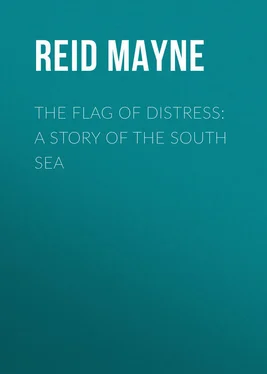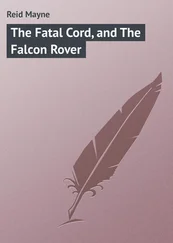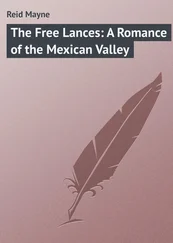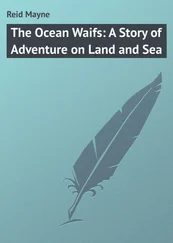Mayne Reid - The Flag of Distress - A Story of the South Sea
Здесь есть возможность читать онлайн «Mayne Reid - The Flag of Distress - A Story of the South Sea» — ознакомительный отрывок электронной книги совершенно бесплатно, а после прочтения отрывка купить полную версию. В некоторых случаях можно слушать аудио, скачать через торрент в формате fb2 и присутствует краткое содержание. Жанр: literature_19, foreign_antique, foreign_prose, foreign_children, на английском языке. Описание произведения, (предисловие) а так же отзывы посетителей доступны на портале библиотеки ЛибКат.
- Название:The Flag of Distress: A Story of the South Sea
- Автор:
- Жанр:
- Год:неизвестен
- ISBN:нет данных
- Рейтинг книги:3 / 5. Голосов: 1
-
Избранное:Добавить в избранное
- Отзывы:
-
Ваша оценка:
- 60
- 1
- 2
- 3
- 4
- 5
The Flag of Distress: A Story of the South Sea: краткое содержание, описание и аннотация
Предлагаем к чтению аннотацию, описание, краткое содержание или предисловие (зависит от того, что написал сам автор книги «The Flag of Distress: A Story of the South Sea»). Если вы не нашли необходимую информацию о книге — напишите в комментариях, мы постараемся отыскать её.
The Flag of Distress: A Story of the South Sea — читать онлайн ознакомительный отрывок
Ниже представлен текст книги, разбитый по страницам. Система сохранения места последней прочитанной страницы, позволяет с удобством читать онлайн бесплатно книгу «The Flag of Distress: A Story of the South Sea», без необходимости каждый раз заново искать на чём Вы остановились. Поставьте закладку, и сможете в любой момент перейти на страницу, на которой закончили чтение.
Интервал:
Закладка:
Much after the same fashion acts Iñez, for she, too, has learned the Californian style of equitation.
The two present a picture that, to the eye unaccustomed to Mexican habits, might seem somewhat bizarre . Their mode of mount – as already said, à la Duchesse de Berri – their half-male attire, hats of vicuña wool, calzoncillas lace-fringed over their feet, buff boots, and large rowelled spurs – all these give them an air of bizarrerie , at the same time a pleasing picturesqueness; and, if appearing bold, still beautiful, as the South Sea wind flouts back the limp brims of their sombreros, and tosses their hair into dishevelment, while the excitement of the ride brings the colour to their cheeks – with flashes, as of fire, from their eyes.
The young English officers regard them with glances of ardent admiration. If they have been but smitten before, they are getting fast fixed now; and both will soon be seriously in love. The paseo de caballo promises to terminate in a proposal for a longer journey in companionship – through life, in pairs.
They are thus grouped: Crozier alongside Carmen – Cadwallader with Iñez. The officers are in their uniforms – a costume for equestrian exercise not quite shipshape as they would phrase it. On horseback in a naval uniform! It would not do riding thus on an English road; there the veriest country lout would criticise it. But different in California, where all ride, gentle or simple, in dresses of every conceivable cut and fashion, with no fear of being ridiculed therefor. None need attach to the dress worn by Edward Crozier. His rank has furnished him with a frock-coat, which, well-fitting, gives a handsome contour to his person. Besides, he is a splendid horseman – has followed hounds before he ever set foot aboard a ship. Carmen Montijo perceives this; can tell it with half a glance; and it pleases her to reflect that her escorting cavalier is equal to the occasion. She believes him equal to anything.
With the other pair the circumstances are slightly different. Will Cadwallader is no horseman, having had but scant practice – a fact patent to all – Iñez as the others. Besides, the mid is dressed in a pea-jacket; which, although becoming enough aboard ship, looks a little outré in the saddle, especially upon a prancing Californian steed. Does it make the young Welshman feel ashamed of himself? Not a bit. He is not the stuff to be humiliated on the score of an inappropriate costume. Nor yet by his inferiority in horsemanship, of which he is himself well aware. He but laughs as his steed prances about – the louder when it comes near pitching him.
How does he appear in the eyes of Iñez Alvarez? Does she think him ridiculous? No. On the contrary, she seems charmed, and laughs along with him – delighted by his naïveté , and the courage he displays in not caring for consequences. She knows he is out of his own element – the sea. She believes that on it he would be brave, heroic; among ropes the most skilled of reefers; and if he cannot gracefully sit a home, he could ride big billows, breasting them like an albatross.
Thus mutually taking each other’s measure, the four equestrians canter on, and soon arrive at the mission.
But they do not design to stay there. The ride has been too short, the sweet moments have flown quickly; and the summit of a high hill, seen far beyond, induces them to continue the excursion.
They only stop to give a glance at the old monastery, where Spanish monks once lorded it over their copper-skinned neophytes; at the church, where erst ascended incense, and prayers were pattered in the ears of the aborigines – by them ill understood.
A moment spent in the cemetery, where Carmen points out the tomb enclosing the remains of her mother, dropping a tear upon it – perhaps forced from her by the reflection that soon she will be far from that sacred spot – it may be, never to revisit it!
Away from it now; and on to that hill from which they can descry the Pacific!
In another hour they have reined up on its summit, and behold the great South Sea, stretching to far horizon’s verge, to the limit of their vision. Before them all is bright and beautiful. Only some specks in the dim distance – the lone isles of the Farrallones. More northerly, and nearer, the “Seal” rocks and that called Campana – from its arcade hollowed out by the wash of waves, giving it a resemblance to the belfry of a church. Nearer still, below a belt of pebbly beach, a long line of breakers, foam-crested, and backed by a broad reach of sand-dunes – there termed medanos .
Seated in the saddle, the excursionists contemplate this superb panorama. The four are now together, but soon again separate into pairs, as they have been riding along the road. Somehow or other, their horses have thus disposed themselves: that ridden by Crozier having drawn off with the one carrying Carmen; while the steed so ill-managed by Cadwallader has elected to range itself alongside that of Iñez.
Perhaps the pairing has not been altogether accidental. Whether or no, it is done; and the conversation, hitherto general, is reduced to the simplicity of dialogue.
To report it correctly, it is necessary to take the pairs apart, giving priority to those who by their years have the right to it.
Crozier, looking abroad over the ocean, says —
“I shall ere long be upon it.” He accompanies the speech with a sigh.
“And I, too,” rejoins Carmen, in a tone, and with accompaniment, singularly similar.
“How soon do you think of leaving California?” queries the young officer.
“Oh, very soon! My father is already making arrangements, and hopes being able to set sail in a week, if not less. Indeed, he has this day been to see about taking passages to Panama. That’s why he was not at home to receive you; leaving me to do the honours of the house, and apologise for his seeming rudeness.”
For that not much apology was needed, thinks Crozier, who is for a time silent, not knowing what next to say. Love, reputed eloquent, is oft the reverse; and though opening the lips of a landsman, will shut those of men who follow the sea. There is a remarkable modesty about the latter more than the former – in the presence of women. Why, I cannot tell; only knowing that as a rule it is so; and certainly in the case of Edward Crozier.
In time he gets over his embarrassment, so far as to venture upon an interrogatory, not very pertinent —
“I suppose, Doña Carmen, you are very happy at the prospect of returning to Spain?”
“No, indeed,” answers Don Gregorio’s daughter. “On the contrary, it makes me rather melancholy. I love dear California, and could live in it all my life. Couldn’t you?”
“Under certain circumstances, I could.”
“But you like the country, don’t you?”
“I do, now. In ten days from this time, I shall no longer care for it – not three straws.”
“Why do you say that, Don Eduardo? There’s an enigma in your words. Please explain them?”
While asking the question, her grey-blue eyes gaze into his, with an expression of searching eagerness – almost anxiety.
“Shall I tell you why, señorita!”
“I have asked you, señor.”
“Well, then, I like California now, because it contains the fairest object on earth – to me the dearest – the woman I love. In ten days or less, by her own showing, she will be away from it; why should I care for it then? Now, Doña Carmen, I’ve given you the key to what you’ve called an enigma.”
“Not quite. Perhaps you will pardon a woman’s curiosity, if I ask the name of the lady who thus controls your likes and dislikes.”
Crozier hesitates, a red spot flushing out upon his cheek. He is about to pronounce a name – perhaps make a speech, the most important he has ever made in his life – because laden with his life’s happiness, or leading to the reverse. What if it should be coldly received?
Читать дальшеИнтервал:
Закладка:
Похожие книги на «The Flag of Distress: A Story of the South Sea»
Представляем Вашему вниманию похожие книги на «The Flag of Distress: A Story of the South Sea» списком для выбора. Мы отобрали схожую по названию и смыслу литературу в надежде предоставить читателям больше вариантов отыскать новые, интересные, ещё непрочитанные произведения.
Обсуждение, отзывы о книге «The Flag of Distress: A Story of the South Sea» и просто собственные мнения читателей. Оставьте ваши комментарии, напишите, что Вы думаете о произведении, его смысле или главных героях. Укажите что конкретно понравилось, а что нет, и почему Вы так считаете.












